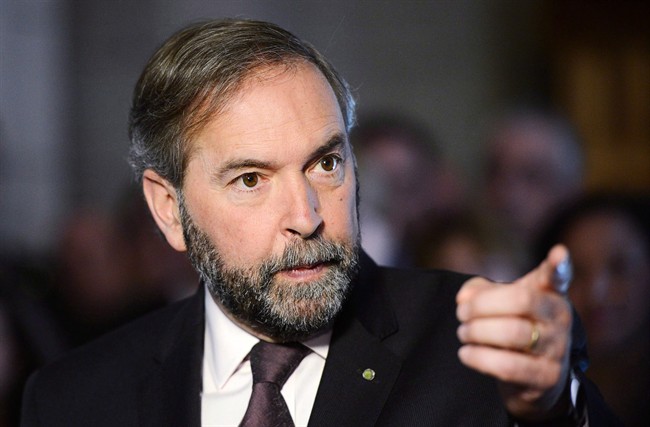OTTAWA – New Democrat MPs are returning to their roots — literally.

They’ve chosen Saskatchewan — which gave birth to the party 52 years ago, and may yet hold the key to their hopes of forming government in two years — for their annual summer caucus retreat.
The two-day gathering in Saskatoon, which starts Tuesday, is ostensibly aimed at plotting strategy for the fall session of Parliament.
But it’s equally about setting the stage for the 2015 election, in which Saskatchewan holds the promise of as many as five new seats for the NDP, thanks to a major redrawing of electoral boundaries in the province.
In the last four elections, with the province divvied up into 14 rural-urban hybrid ridings, the NDP won no seats despite winning a majority of the votes in urban areas; the Conservatives picked up 13, the Liberals one.
The NDP stands to make big gains under redistribution, which has created wholly urban ridings in Regina and Saskatoon.
“There’s no question that for us the new math that’s been put in is definitely going to play out differently,” NDP Leader Tom Mulcair said in an interview.

Get daily National news
“We will be winning seats, and quite a few of them, in Saskatchewan so it’s important for us to show the flag, to be there.”
The NDP vaulted into official Opposition status for the first time in its history in 2011, propelled by an orange wave that swept Quebec, a province in which the party had barely registered until then but which suddenly delivered 59 of its 75 seats.
“I like to joke in Quebec we had 59 new trees with no roots and in Saskatchewan we have our deepest roots but no more trees,” said Mulcair. “We want to get back, to stay with the metaphor, to our roots.”
Mulcair’s challenge for 2015 is to hang on to the party’s gains in Quebec while adding 69 seats elsewhere — no easy task, especially with the resurgent Liberals, under newly minted Leader Justin Trudeau, eating into NDP support. Saskatchewan may well offer the lowest hanging fruit for the NDP.
Still, it can’t hurt to mend fences with the province’s popular premier, Brad Wall. Mulcair is scheduled to meet with him Monday, en route to the caucus retreat.
Wall has been a vociferous critic of what he’s termed Mulcair’s “divisive” theory that booming oil and gas resources have inflated the dollar and hurt the manufacturing sector in central Canada. Earlier this year, he accused Mulcair of betraying Canadian interests when the NDP leader criticized Ottawa’s environmental record and the Keystone XL pipeline while speaking in Washington.
And federal Conservatives aren’t going to let Saskatchewan voters forget Mulcair’s stance on natural resources.
“While the NDP advocate higher taxes, they also denounce our resource sector, including agriculture, and the thousands of workers who make a good living off the land,” Agriculture Minister Gerry Ritz, who represents a rural Saskatchewan riding, said in a release Sunday, a message repeated on Twitter.
“While in town Mr. Mulcair should listen to the people of Saskatchewan and stop standing in our way to prosperity and well paying jobs.”
But Mulcair and Wall have also become unlikely allies over the Senate, sharing the belief that the scandal-plagued upper house should be abolished.
The Senate — and the expenses scandal that has put four senators under RCMP investigation — will be a dominant theme at the caucus retreat as New Democrats ponder how to keep the heat on Prime Minister Stephen Harper. Mulcair won rave reviews last spring for his prosecutorial questioning of the prime minister and is promising more of the same when Parliament resumes, sometime in October.
In addition to ethics, Mulcair said, the retreat will set the economic themes the NDP plans to push during the 2015 campaign: household debt, credit card fees, seniors’ poverty, inter-generational equity.





Comments